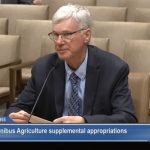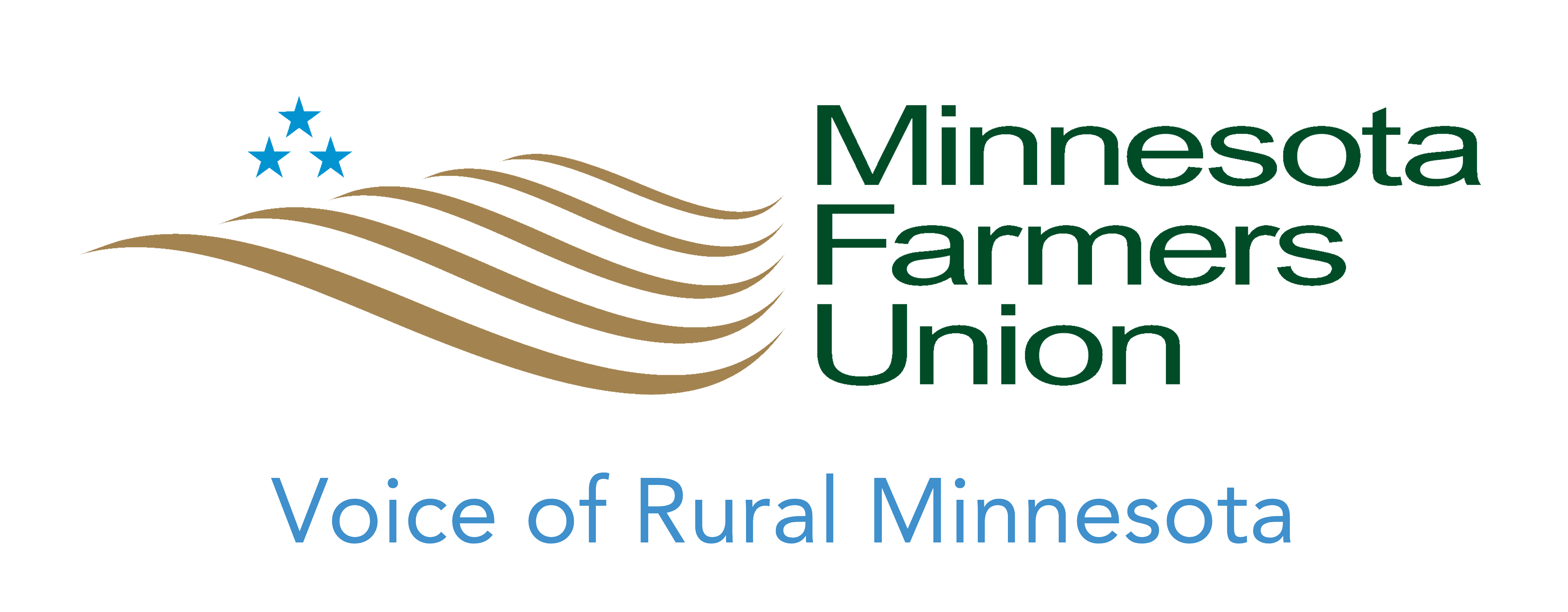Legislative Update: Ag budget proposals released
This week, Senate and House committees released their supplemental funding proposals for agriculture and other jurisdictions ahead of a final legislative deadline this Friday. MFU priorities—including addressing a shortfall in MDA’s AGRI program, a next step on the MinnesotaCare Public Option, meat processing technical training grants, and funding for soil health initiatives—are moving forward. As omnibus budget bills continue to be released, MFU’s leadership and legislative team will be reviewing proposals, providing feedback to lawmakers and testifying on issues relevant to our grassroots policy.
Friday, April 19, marks the third and final deadline for the Minnesota legislature, meaning that all bills that include spending need to be approved by committees in both the House and Senate. At the Capitol, it’s called ‘deadline week’ and it’s a doozy. Chairs are working, sometimes at all hours, to craft their omnibus budget proposals. These big, do-all bills are put together by each committee, pulling together all the individual bills that were heard throughout this session (and sometimes even last session). The challenge for committee chairs is crafting a compromise proposal that meets constrained budget targets and can earn majority support from their committee.
Of course, there are exceptions. The tax committee doesn’t need to adhere to deadlines and the rules committees can waive the rule in certain cases. It’s also important to remember that this is a supplemental budget—any additions or changes amend the budget that was passed last year.
For advocacy organizations, this can be a disappointing week, because proposals that were heard in committee are often not included in omnibus bills. That said and for MFU, priority issues continue to move forward, increasing the likelihood that they’ll be included in a final deal.
For agriculture, Chair Aric Putnam (DFL-St. Cloud) took testimony on his omnibus budget bill on Monday and Chair Samantha Vang (DFL-Brooklyn Center) took testimony on her proposal on Tuesday. In the Senate, MFU President Gary Wertish testified on the proposal.

MFU President Gary Wertish testifying at the state legislature.
“I’m glad to share our strong support for your supplement budget proposal and to thank you and your team for your hard work in crafting it,” Wertish told the committee during testimony. “One of Chair Putnam’s strengths—and a strength of this committee—is that you listen directly to farmers, and we see that reflected in this proposal.”
The largest items in both the Senate (SF3955) and House (HF3763) budget proposals addressed the shortfall in the Agricultural Growth Research and Investment (AGRI) program and address nitrates in groundwater in Southeast Minnesota.
The Senate agriculture omnibus bill included:
- $2.9 million to address shortfall in AGRI, ensuring that this program can continue to serve farmers and others in our agriculture economy well into the future. As Executive Committee member Josh VanDerPol shared in testimony, this umbrella program supports work on farm-to-school, meat processing, biofuels infrastructure, beginning farmers programs and other initiatives that make Minnesota a leader in agriculture. Even more importantly, the undesignated funds in AGRI allow MDA to respond quickly to urgent challenges. When COVID-19 shut down the large, consolidated packing plants, putting pressure on the already strained system of small and mid-sized processors, MDA sprang into action to ensure workers were safe and that farmers could get their livestock to market. They created a rapid response mini-grant program to help small processors scale up quickly, helped lockers purchase protective equipment for employees, and provided a matching service for livestock producers who couldn’t find processing. This work was important not only for farmers and others who were helped through a challenging year, but also because these programs served as effective pilots for initiatives funded last session.
- $3.25 million to address nitrates in southeast Minnesota, ensuring that everyone has access to safe drinking water and helping farmers make voluntary investments in soil health initiatives that promote water quality over the long-term. Specific initiatives, included:
- $750,000 for reverse osmosis systems in southeast Minnesota counties.
- $500,000 for soil health equipment grants, targeted specifically at southeast Minnesota counties.
- $2,000,000 for addressing nitrate pollution in private wells through a program at the Minnesota Department of Health.
- $375,000 for meat processing training grants for K-12 schools, building on a program MFU championed in previous sessions and supporting the next generation of meat cutters. This competitive grant program will help secondary schools purchase supplies and equipment, do limited renovations, and gain professional development needed to stand up meat cutting courses. As MFU shared in testimony, the investment is well-timed, because secondary schools can rely on Central Lakes and Ridgewater Colleges—both of which have started meat cutting programs—for training educators. Secondary courses will also provide a pathway for students to enroll in these programs.
- $100,000 for farm to school and early care funding to help farmers access new markets and ensure young people have access to healthy, nutritious meals that aid their learning. This will help the program serve more farmers and makes sense because the program is being expanded to include in-home childcares under the bill.
- $300,000 to protect poultry farms from High Path Avian Influenza (HPAI) through AGRI Livestock Protection Grants aimed at discouraging wild birds from interacting with domestic flocks. This program was piloted with undesignated AGRI funds, a good example of the success of that program.
- $50,000 for a land trends report to better understand dynamics leading to skyrocketing land values that squeeze out new farmers and make it harder for family farms to transition land to the next generation.
- $125,000 in elk depredation funding and a cervidae crop damage report, both of which will help farmers whose crops are being decimated by wild animals managed by the state.
The Senate bill also includes non-funding items that MFU supported throughout session. These include language to ensure that programs serving emerging farmers—which were a top-funded item last session—are sustainable going forward. The bill also gives added flexibility to farmers markets to help more markets implement SNAP and EBT. Finally, the bill reauthorizes the Agricultural Fertilizer Research and Education Council (AFREC), continuing the current fee on fertilizer, and dedicating $1.24 million to fertilizer research.
Significantly, neither bill includes an increase in fertilizer fees that was contemplated by House lawmakers earlier this session.
The House agriculture omnibus bill also prioritizes AGRI and responding to nitrates in groundwater in the southeastern part of the state. However it includes some different spending priorities which MFU also supports including:
- $300,000 for Beginning Farmer Equipment and Infrastructure grants, helping that program serve more beginning and emerging farmers in the upcoming year.
- $100,000 for biofuels infrastructure grants, which help small fuel retailers upgrade their tanks and pumps, enabling them to sell high blends of biofuels.
- $250,000 for AURI Food Entrepreneur support.
In addition to sharing thanks for these items, in House testimony MFU Government Relations Director Stu Lourey shared concerns about two items in the proposal. First, as proposed, the bill takes the interest earned off the grain indemnity fund and puts in into a new program to provide debt relief to farmers who sell at farmers markets. In conversations with lawmakers, MFU has shared that the ability for the grain indemnity fund to grow interest is an important policy design that will protect the fund long-term and better ensure that it can cover farmers losses when grain elevators fail.
The farmers market debt relief program could be a focus for MFU in future sessions, but initial feedback from members has indicated that the program might not work well as it’s currently proposed. MFU has worked hard on other provisions related to farmers’ markets, including repealing the sales tax on cottage food which received a hearing in the House.
Second, in testimony MFU shared concern about rededicating funding for fertilizer research to initiatives aimed at addressing nitrates in groundwater in southeast Minnesota.
As they stand, both agriculture proposals are just that—proposals. As of writing this on Wednesday, both committees have yet to vote on amendments which could change the bill.
Clean Water Council
Related to work in the agriculture committees, MFU has worked to advance recommendations from the Clean Water Council related to agriculture.
“We were proud to help the Clean Water Council shape their supplemental funding recommendations through our representative on the Council and were glad to see them unanimously approve these recommendations in March,” said Wertish in his comments to the House Committee, highlighting the work of Peter Schwagerl of Big Stone County on the Council. “Overall, we believe this is a balanced proposal that will address the timely challenges and accelerates on-the-ground action to promote water quality.”
The Senate made cuts to the Council’s recommendations related to agriculture and MFU has been working to make sure that programs are funded as part of a final deal.
Healthcare proposals move
On healthcare, MFU priorities are also moving ahead. The House Health Finance and Policy Committee, chaired by Rep. Tina Liebling (DFL-Rochester) and the Senate Health and Human Services Committee, chaired by Senator Melissa Wiklund (DFL-Bloomington) will hold hearings on their respective budget omnibus bills on Wednesday. Those bills (SF4699, HF4571) will determine what progress is made on establishing a MinnesotaCare public option, MFU’s top legislative priority.
In the Senate the legislation includes policy provisions that will direct states agencies to submit a federal waiver application for the MinnesotaCare Public Option, a key next step in the process of expanding access to the program. MFU has been working to ensure these provisions get passed into law this session and ensure Minnesota continues taking steps to ensuring that farm families have access to the healthcare they need. Unfortunately in the House, those provisions were not included.
Both omnibus bills include additional legislation that MFU has supported this session. This included strengthening rules governing health maintenance organization (HMO) conversions, an update of the reimbursement independent pharmacies receive for serving Medicaid patients, which will provide a key lifeline for struggling pharmacies while the Legislature works more in future sessions to address the anticompetitive conduct of pharmacy benefit managers. Included in the House omnibus, but not the Senate, is enhanced disclosure of planned hospital closures, which builds off MFU’s work last session to address large healthcare mergers that can often lead to closures of facilities and loss of services.
Relatedly, earlier this week the House took action to address medical debt. Parts of the Debt Fairness Act, a key initiative of Attorney General Keith Ellison, that was introduced by Rep. Liz Reyer (DFL-Eagan) and Senator Liz Boldon (DFL-Rochester). Those provisions ban the automatic transfer of medical debt to a patient’s spouse, ban medical debt from being reported to credit bureaus, protect the last $4,000 of someone’s bank account from collections of medical debt, and cap the garnishment of wages based on income. MFU President Wertish spoke in support of the legislation noting that because of the high costs of health insurance farmers face, some make the decision to go without and are at risk of incurring major medical debt.

MFU President Gary Wertish speaking at Debt Fairness Rally.
The House Commerce and Finance Committee held an informational hearing last week on HF4206 authored by Rep. Jess Hanson (DFL-Burnsville) that would put a moratorium on the acquisition of medical providers by private equity firms and real estate investment trusts. MFU issued a letter and testified in support of the legislation, noting the way private equity has increased healthcare consolidation in Minnesota, particularly among nursing homes and independent physicians.
Of course, this is just a snapshot of MFU’s legislative work and developments at the Capitol this week. If you have questions, thoughts, or concerns, please reach out at stu@mfu.org or (320) 232-3047 (C).
